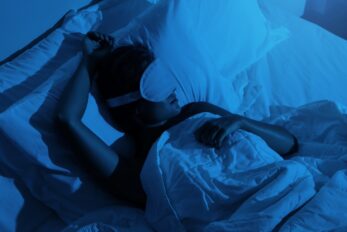With the power of the internet at your fingertips, there’s practically no limit to accessing useful knowledge. With a quick search you can uncover a wealth of information on any subject—sleep included!
You should note, however, that not all information is created equally. There are plenty of false, sleep-related claims bouncing around on the internet that aren’t backed by firm research or scientific evidence. So, to make things a little easier, we’re here to help you separate fact from fiction with these seven common sleep myths. After all, you wouldn’t want misinformation getting in the way of your blissful slumber!
Myth #1: The ability to fall asleep anywhere, at any time is healthy
Despite how handy this ability seem, it may be indicative of something more problematic. In fact, if you’re falling asleep at any time, in any location, evidence points to signs of possible chronic sleep deprivation. Not only does sleep deprivation negatively impact day-to-day life, it can also place you at a higher risk during activities that require alertness, such as driving or operating dangerous machinery.
Myth #2: Some healthy adults only need to sleep for five hours or less
While there is evidence to suggest that some sleepers can function relatively well without getting at least the recommended seven hours of sleep, this group is the exception rather than the rule. Despite how rested you may feel after five hours of sleep, habitually failing to sleep for a sufficient length on a regular basis can lead to health problems. By not getting enough sleep, your cardiovascular, metabolic, mental, and immunological health may all suffer as a result.
Myth #3: Your brain and body can learn to function equally well with less sleep
This is another particularly harmful myth, as restricted sleep can lead to increased sleepiness up until a plateau. Much like the five-hours-or-less group, some may appear to adapt to consistently under-sleeping. The reality, however, is that weeks of reduced sleep lead to decreased performance—especially in shift workers, who face higher morbidity and mortality rates. The verdict on this one is simple: Stay away from unhealthy sleep habits that may have long-term consequences.
Myth #4: One night of sleep deprivation has lasting consequences
Although this is (thankfully!) a myth, one night of sleep deprivation can have some short-term effects such as decreased cognitive performance, an increase in blood pressure, and increased cardiovascular mortality. Luckily, most of these negative effects are likely to resolve themselves after catching up on some recovery sleep the following night. But if you don’t catch up on sleep, the effects are cumulative.
Myth #5: A warmer bedroom is better than a cooler one for sleep
This one goes out to all of you who struggle to sleep in a hot and stuffy room! Evidence shows that warmer sleep environments are associated with poorer sleep and can limit sleep health as a result. Ideal bedroom temperatures seem to range between 18°C and 21°C, so if heat is keeping you up, you may need to find a more comfortable temperature.
Myth #6: If you can’t sleep, it’s better to stay in bed until you fall back asleep
As surprising (and counter-intuitive) as it sounds, the best way to fall back asleep after difficulty sleeping is to leave your bed. This isn’t a free pass to watch some late-night or early-morning TV though—sorry! Instead, you should avoid blue light and only return to bed when you feel tired enough. By following these instructions, you’ll likely find a significant decrease in the time required to fall back asleep.
Myth #7: Watching TV before bed is a good way to relax
We get it—you’ve had a long day, and you probably want to unwind a bit before bedtime. Unfortunately, those late-night viewing sessions aren’t doing your sleep any favours and are likely contributing to you getting less sleep on average. Stimulating content before bed, along with the blue light emitted by screens, could be causing you sleep difficulties. It’s best to drop screen time at least an hour before bed in favour of something more relaxing—reading, journaling, or quiet reflection are all great options.
Are you practicing any of these sleep myths? Why not try switching things up tonight—your body may thank you for it! And if you’re still experiencing trouble sleeping, book a free consultation to see how you can improve your sleep quality.
Author’s Note: We wrote this post with reference to a journal on PubMed Central®. You can read the full journal here.






